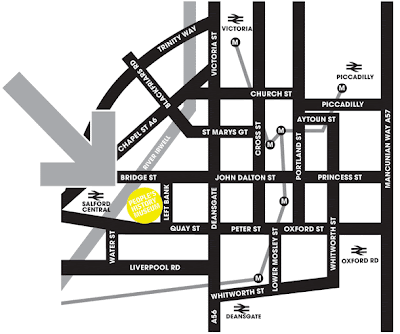
People’s History Museum
Few people, when we talk of Democracy, are aware of what a new idea it actually is and that the struggle for democracy went hand in hand with Labour rights and the development of the British Labour Party. Indeed it was only in the elections of 1918 in Ireland and in England that you had true universal suffrage for all without a property qualification for voting and votes for women, albeit over 30 – as women under 30 were considered too excitable and frivolous! Indeed!
http://daithaic.blogspot.com/2007/10/first-female-member-of-parliament.html
The People’s History Museum tells the dramatic story of the British working class’s struggle for democracy and social justice - told at the only national museum in Manchester, the radical city where it belongs. The museum has reopened after a £12.5m redevelopment, which included the refurbishment of the existing Pump House and the construction of a four storey extension alongside it. The old and new buildings are joined together by a spectacular glass walkway. The museum galleries, changing exhibitions, education service, Labour History Archive & Study Centre, Textile Conservation Studio, corporate facilities, café and shop are housed in the new building.

Cotton Mill, Ancoats 1820
Two hundred years ago Manchester was at the centre of Britain’s Industrial Revolution. Based on the cotton textile industry, the town became the world’s first industrial city. Despite high wages in good times, workers endured appalling living and environmental conditions. Little could be done to improve these; there was no political structure and Manchester, for example, had no MP.

On 19 August 1819 a reform meeting held on St Peter’s Field in Manchester attracted over 60,000 mill workers and their families. Magistrates sent in soldiers to arrest the leaders. There were 17 dead and over 400 seriously injured. The event became known as the Peterloo Massacre and led to the first reform of Parliament in 1832.
The People's History Museum tells the extraordinary story of ordinary people. It is the only national museum dedicated to the working people of Britain and the world-changing events they led to change society, improving life for future generations.
The urbanisation of Manchester largely coincided with the Industrial Revolution and the Victorian era, resulting in it becoming the world's first industrialised city.
“Cottonopolis” as Manchester became known has a notable place in the history of Marxism and left-wing politics; being the subject of Friedrich Engels' work The Condition of the Working Class in England in 1844; Engels himself spent much of his life in and around Manchester, and when Karl Marx visited Manchester, they met at Chetham's Library. The economics books Marx was reading at the time can be seen on the shelf in the library, as can the window seat where Marx and Engels would meet. The first Trades Union Congress was held in Manchester (at the Mechanics' Institute, David Street), from 2 to 6 June 1868. The economic school of Manchester capitalism developed there, and Manchester was the center of the Anti-Corn Law League from 1838 onward. Manchester was also an important cradle of the Labour Party and the Suffragette Movement. Indeed it has been an inspirational city in many ways from the development of Laissez-faire capitalism to the United Society of Believers or the Shakers as they are better known.

Railway Banner
In these days of Banking Crises and dismay at lack of values what better place to rediscover the role of honest labour as the source of values in society than this museum celebrating how ordinary people changed the world we live in.
Website;
http://www.phm.org.uk/
People’s History Museum
Left Bank, Spinningfields,
Manchester, M3 3ER,
England.
Open Monday - Sunday
10.00am - 5.00pm

No comments:
Post a Comment